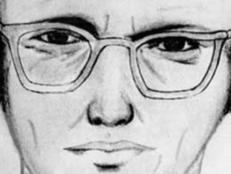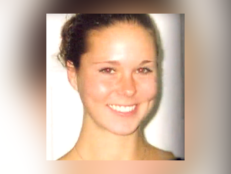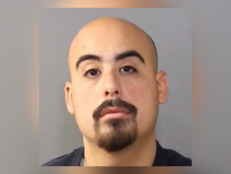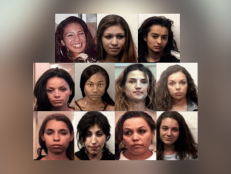A Brief History Of The Black Dahlia Case
Since 1947, the brutal death of 22-year-old Elizabeth Short has remained Hollywood’s most enduring unsolved mystery.

Elizabeth Short [Getty Images/Bettmann/Contributor]
It's been over 75 years since the young woman who became infamously known as the "Black Dahlia" was found brutalized and mutilated in a vacant lot in Los Angeles. Since January 15, 1947, the death of 22-year-old Elizabeth Short has remained Hollywood’s most enduring unsolved mystery.
The case rocked post-war Los Angeles and had all the ingredients to mesmerize the public: a vicious murder, a beautiful young woman who longed to break into the movie industry, multiple suspects, and a press corps that latched onto the story and made the grisly killing front-page news. But more than seven decades later, the question remains: who killed Elizabeth Short?
Many people believe they know who was responsible for the death of the Black Dahlia. His name was Dr. George Hodel, a brilliant and successful physician who rubbed elbows with Hollywood’s elite power players and was never charged with the crime that remains an explosive chapter in Los Angeles lore.
Elizabeth Short was a native of Massachusetts who ended up in Northern California during World War II. She originally headed west in 1942 to reconnect with her long-lost father, whom she believed had killed himself when she was only six years old.

Police bulletin distributed by the Los Angeles Police Department [WikiCommons/City of Los Angeles Police Department]
Short then migrated to Southern California and worked for a time at a military base. She had a fondness for men in uniform that would last the rest of her short life.
In September 1943 at the age of 19, Short was arrested for underage drinking at a bar in Santa Barbara and was given a choice by authorities: She could stay in California and face charges, or return home to her mother in Massachusetts. She chose to return to the East Coast and eventually moved to Miami and worked as a waitress.
In April 1946, Short returned to Southern California, where she would spend the final nine months of her life drifting between boarding houses and hotel rooms with various roommates. She sometimes worked as a waitress, but longed to be a movie star like countless other young, beautiful women who descend on Hollywood.
In December 1946, Short took a trip to San Diego with a man named Robert “Red” Manley, a 25-year-old salesman she was dating. On January 9, 1947, the pair returned to Los Angeles, and Manley dropped Short off at the Biltmore Hotel in downtown Los Angeles.
Short was supposed to meet her sister there, who was visiting from Boston. Witnesses reported seeing Elizabeth Short in the lobby of the hotel. She then exited the hotel and vanished.
Nearly a week later, on the morning of January 15, 1947, a woman walking with her young daughter spotted Short’s body in a vacant lot in the Leimert Park neighborhood of Los Angeles. The woman originally believed the body was a mannequin, but upon closer inspection realized it was a nude female body that had been cut in half with the precision of a surgeon.
Upon further examination, investigators realized the body had also been completely drained of blood and washed before it was dumped in the lot. In addition to the bisection, Short’s body had been grotesquely mutilated: Her mouth had been slashed from ear to ear, known as a “Glasgow smile.” Her thighs and breasts had been cut, and Short’s body was posed with her legs spread apart and her arms raised over her head.
It appeared as if the killer regarded his victim as a work of art. An autopsy determined Elizabeth Short had been dead for 24 hours or less. The two pressing questions authorities had to answer were who committed the grisly murder, and where had Elizabeth Short been for nearly a week, alive, after leaving the Biltmore Hotel?
The press nicknamed Short “the Black Dahlia” as a twist on a popular film from the previous year entitled The Blue Dahlia, because of Short’s eye-catching black hair and often black clothing. The sensational story was front-page news with investigators and amateur sleuths alike trying to determine who was responsible for the murder.
The alleged killer sent taunting notes to Los Angeles newspapers, which were reprinted and kept the story in the headlines for months. The list of suspects was enormous. Short was known to date many men, and police tediously worked through their list of men. Red Manley, the man who dropped Short off at the Biltmore Hotel, was originally the prime suspect, but was later dismissed. Despite a huge effort by law enforcement, the murder remains unsolved to this day
One suspect’s name continues to reappear throughout the years: Dr. George Hodel. The wealthy physician ran a clinic treating venereal diseases and has been a suspect in the Black Dahlia murder since 1949, when he was arrested for allegedly raping his 14-year-old daughter.
The LAPD suspected Hodel of several murders and he was recorded on a police bug in his house in 1950 saying, “Supposin' I did kill the Black Dahlia. They couldn't prove it now. They can't talk to my secretary anymore because she's dead.... They thought there was something fishy. Anyway, now they may have figured it out.”
Steve Hodel, George’s son, is a retired LAPD detective who set out to clear his father’s name in the 1990s, but eventually became convinced that his father had indeed killed Elizabeth Short. Steve Hodel believes his father met Short at his venereal disease clinic and that the two had a relationship outside of his work as a physician.
George Hodel’s medical background also adds to the intrigue, because of the way Short’s body was cut in half so cleanly. In 2004, unreleased Los Angeles District Attorney files that point to George Hodel as the main suspect in the Black Dahlia case were discovered in a vault, adding more evidence to Steve Hodel’s argument. Some believe George Hodel’s powerful connections in entertainment, politics, and law enforcement allowed him to avoid prosecution in the Black Dahlia murder and other cases.
George Hodel fled the United States in 1950 and lived overseas for 40 years until he returned to America in 1990. He died in 1999 at the age of 91. He was never charged in the Black Dahlia case.









